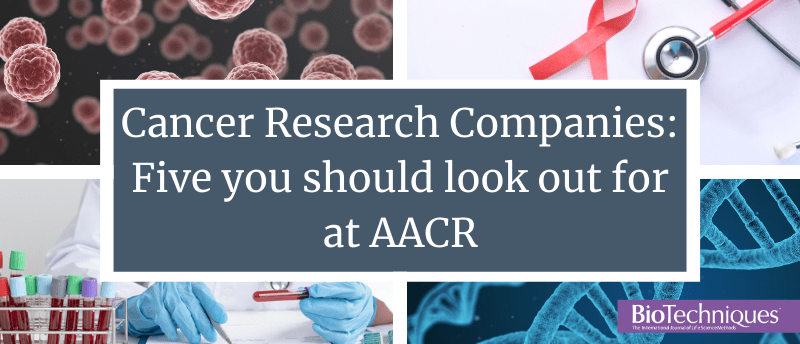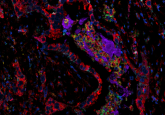Five cutting-edge cancer research companies you should know about before AACR 2022

As the annual meeting of the American Association for Cancer Research rapidly approaches, BioTechniques brings you five cancer research companies using innovative new technologies to watch out for at the event. For those at the lab bench, it is important to keep up to date with the cutting edge clinical applications of technological developments and basics research discoveries. So, catch up with the latest clinical trials using exciting technological developments such as checkpoint inhibitor therapy and Bicycles. Where could your research lead and what could it offer to the next great leaps in cancer treatment?
Bicycle Therapeutics
With the tag line, ‘we didn’t wait for the next advance against cancer. We created it.’ Bicycle Therapeutics is a spin-out company based on technology developed in the laboratory of Greg Winter (Cambridge, UK). ‘Bicycles’ are synthetic short peptides that can be used for targeted therapies. Targeted therapies stop specific genes or proteins to help suppress cancer growth or spread. Current targeted therapies include antibody-drug conjugates, which are associated with high toxicity levels and remain in the body for longer than expected [3]. ‘Bicycles’ are anti-body mimics that can penetrate tumors, bind to specific targets and take out the target by delivering toxins. All while reducing the time toxins exist in the body and reducing unwanted side effects.
Bicycle peptides are being used to target Ephrin type-A receptor 2, which regulates cell migration, adhesion proliferation and differentiation and is often overexpressed in hard-to-treat cancers. Bicycle therapeutics are using a ‘bicycle’ peptide to deliver toxins directly to the Ephrin type-A receptor 2 to treat non-small cell lung cancer, bladder cancers, triple-negative breast cancer, ovarian cancer, gastric cancer and esophageal cancer. They are currently evaluating a Phase I/II trial for this particular use of the bicycle technology. Other uses of the bicycle technology, which target membrane type 1 matrix metalloproteinase, are currently being evaluated for efficacy and safety in a Phase I/IIa trial—making exciting steps for the future of the company and targeted drug delivery.
ALX Oncology
ALX Oncology develops therapies using technology that blocks the CD47 checkpoint pathway. This pathway allows macrophages to recognize their own healthy cells. Some cancer cells start to present the CD47 protein, which means that macrophages see healthy cells and do not attack. Some treatments have been developed that block the CD47 pathway and cause cancer to release biochemicals that activate macrophages. However, the CD47 receptors on healthy native cells also become blocked and release macrophage activation signals causing severe side effects. ALX Oncology’s lead product blocks the CD47 pathway without activating macrophage response and works in tandem with other anti-cancer drugs, which specifically bind to cancers – and not to healthy cells – and induce the macrophage response [4]. These drugs cannot bind to healthy cells and macrophage response is limited to the cancer cells.
The drug, called Evorpacept, is currently in a phase I/II trial evaluating safety and tolerability when used in conjunction with anti-cancer drugs Venetoclax and Azacitidine to treat AML. The trial is due to complete in December 2023. Two trials in collaboration with Merck are in the phase II stage and are looking at using Evorpacept in conjunction with anti-cancer drugs to treat head and neck squamous cell carcinoma.
AngioDynamics
AngioDynamics has a different approach to oncology from the cancer research companies mentioned previously. They use medical devices rather than therapeutics. One product they have developed is the BioSentry Track Sealand System, which reduces the occurrence of biopsy-related collapsed lung. When taking a biopsy of the lung, surgeons need to use a large needle to take tissue from the middle of the lung. When this large needle is removed, there is a high risk for a collapsed lung. The device designed by AngioDynamics uses a hydrogel plug that expands once the needle is removed and significantly reduces the risk of a collapsed lung. Another product of theirs is a device used to reduce blood loss in surgeries to remove liver cancer. Humans can live with half a liver, so removing the parts containing cancer is possible. However, a common complication is significant levels of blood loss. The Habib 4X Bipolar Resection Device uses radiofrequency energy for tissue coagulation which means cancer can be removed without severe bleeding.
Fate Therapeutics
Fate Therapeutics (CA, USA) based in San Diego, is a clinical-stage biopharmaceutical company focused on developing cellular immunotherapies for patients with cancer. They genetically engineer human-induced pluripotent stem cells to have selected biological properties. The company has nine clinical trials nearing the end of phase 1 in different cancer areas such as acute myeloid leukemia and Solid Tumors. One of these trials is using allogeneic natural killer cells to treat resistance to checkpoint inhibitor therapy.
Checkpoint inhibitor therapy is a new and approved cancer therapy that works by inhibiting checkpoint proteins from binding with partner proteins, allowing T cells to kill cancer cells. However, in most cases, a patient’s cancer progresses despite the therapy. This resistance to the therapy has previously been linked to reduced immune cell infiltration, impaired cytokine response and altered expression of major histocompatibility complex (class 1) [1]. To overcome this resistance, Fate Therapeutics are developing a natural killer cell cancer immunotherapy following findings that allogeneic natural killer cells can recognize and induce lysis on cells with major histocompatibility complex (class 1) downregulation [2].
Cullinan Oncology
The biopharmaceutical company, Cullinan Oncology (MA, USA), focuses on targeted oncology and Immuno-oncology therapies. They sponsor early-stage cancer therapeutics through clinical trials. Recently, the FDA has granted a breakthrough therapy designation for a treatment, backed by Cullinan Oncology, for patients with locally advanced or metastatic non-small cell lung cancer. The treatment is an orally available EGFR inhibitor that targets cells expressing EGFR exon 20 insertion mutations while sparing cells expressing wild-type EGFR. This treatment is currently the most advanced treatment sponsored by Cullinan Oncology. It is nearing the end of phase 2 clinical trial with another two drugs in phase 1 clinical trials and another three in pre-clinical testing.
We will be at AACR and can’t wait to catch up with all the latest advancements in the field of oncology after such a long time apart. Catch us at booth 3025.





